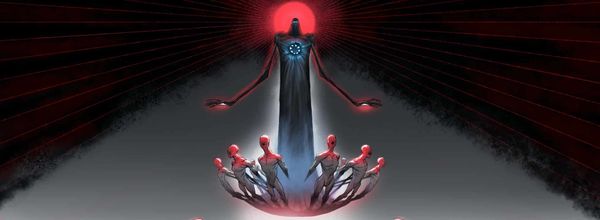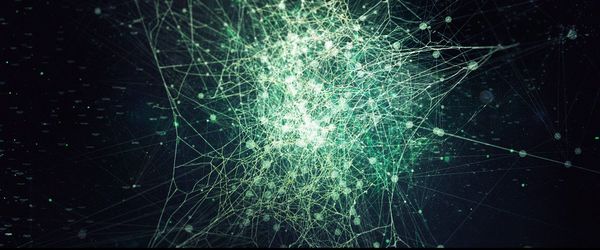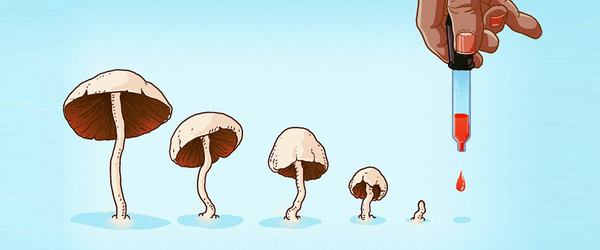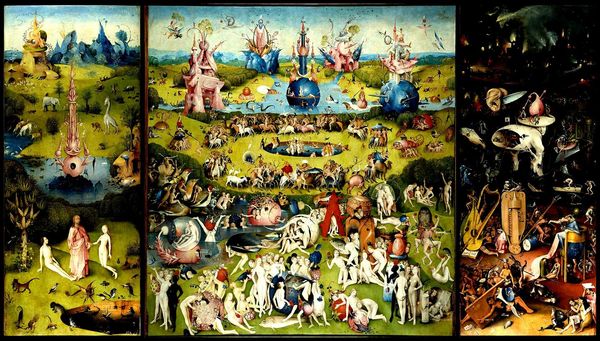Eric Brown • • 15 min read
The Automation Revolution is Coming, and Universal Basic Income Might be Humanity’s Only Hope
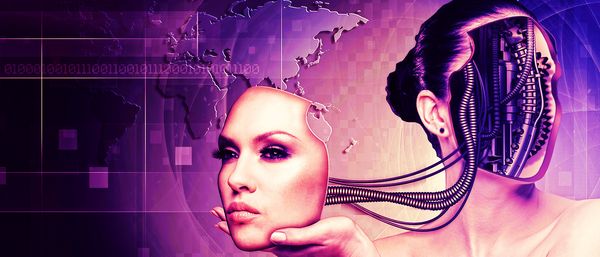
Henry Ford is widely credited as a kind of messiah of the industrial revolution. Through the creation of the assembly line and automated production, he introduced mass production to the masses.
Mass production, through its focus on task specialization throughout the production process, increased output exponentially across industries.
One man could now do the work of hundreds.
Not bad, Mr. Ford.
This increase in productive efficiency slashed the cost of the end product. Now, products that were reserved for the upper echelons of society could be afforded by the average Joe. Products like cars, household appliances, clothing, and unique experiences.
This new lifestyle and increased need for workers to handle the production lines created the working middle-class, a middle-ground between the proletariat vs. bourgeoisie structure that reigned supreme for so long beforehand.
The introduction of new technology radically transformed industry and created a new class of working individuals.
The industrial revolution helped mankind transcend its physical limitations and accomplish more than ever thought possible.
The new system was greater than the sum of its parts.
Fast forward to today. We stand at the precipice of a new revolution. We are walking on the razor’s edge of either the most spectacular societal development since the organization of individuals into tribes, or the catastrophic introduction of a system that would create greater inequality than feudal societies.
Mankind has experienced 3 industrial revolutions to date: the agricultural revolution, the industrial revolution, and the information revolution. Now, we are approaching the fourth revolution.
The automation revolution.
The Impending Automation Revolution
The automation revolution is the definitive transition from human labor to automated, mechanized labor.
As robots, machines, and artificial intelligence (AI) become increasingly dexterous, clever, and capable, there will be very few jobs that machines cannot do as well or far better than their human counterparts.
Machines work 24 hours a day, 7 days a week, 365 days a year without breaks, holidays, or salary increases. Once installed, they cost only pennies on the dollar for electricity and sporadic maintenance. Machines do not demand better working conditions, holiday time, or exaggerated pensions.
Even if a machine takes 10x longer to accomplish a task than its human counterpart, it is 100x cheaper to do it.
The economic math is always in favor of the machine. At this moment, one machine can replace about 6.5 workers. Amazon currently employs around 45,000 robots. Perspective.
We can now better understand another term coined in light of the automation revolution: ‘technological unemployment’ — i.e. unemployment caused by machines.
Can intelligent, autonomous machinery really compete with tried and tested human labor?
Most definitely.
Jobs, Automated.
You may be wondering exactly which jobs are most threatened. Truth is, if you create an ‘output’, whether that is a physical good, knowledge, or creative endeavor, your job can be seamlessly transferred to a machine.
If you feel that your job is currently safe, give it 5 years.
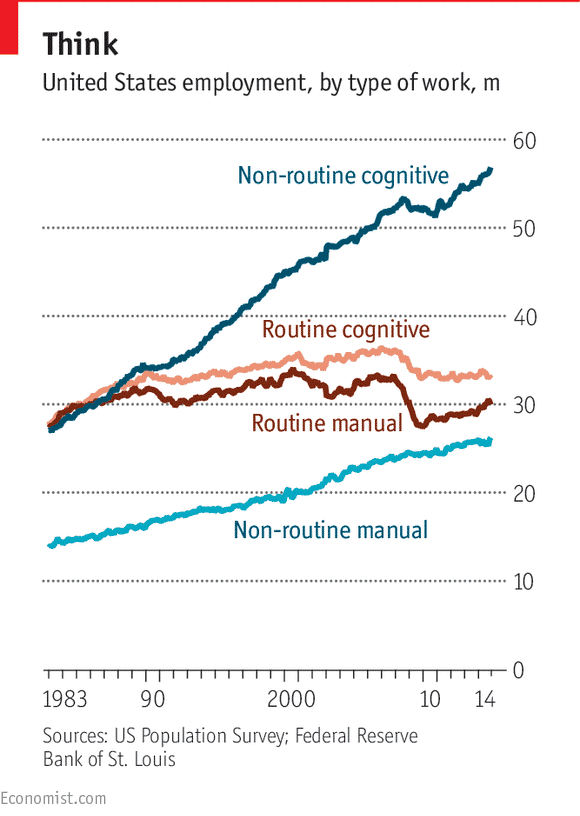
Current discussions on automation and job loss focus on manual labor. Whether that be the production of goods, construction, service, or transportation of goods/people.
Reports estimate that 47% of the general workforce is threatened; 35% in the UK; and an astounding 77% in China.
A prevalent example is that of the self-driving vehicle. Automotive giants are currently investing in developing self-driving technology. The technology can replace food delivery, taxis, bus drivers, movers, and a host of other transport jobs. This shift alone would displace millions of city-based jobs, but let’s not forget about the most prevalent transport job in the United States:
Semi truck drivers.
The automated semi truck revolution is already in motion, as self-driving trucks are moving through trials now.
These are expected to be ready in the next few years, not decades. With ~8.7 million Americans employed in the trucking industry currently, the impact of automation will soon come smashing down on developed society.
What about service jobs? Are those safe?
Nope.
The rapid proliferation of ‘self-serve’ apps is a bold indicator here. I’m sure you’ve seen the self-ordering kiosks pop up at many of the fast food chains you frequent. Even the coveted role of burger-flipper can be automated. Soon, fast-food restaurants may only have one person in attendance to ensure the system is running without issue.
There are 3.8 million fast food workers in the US. That’s a lot of jobs. Plus, the machines sure won’t be demanding a $15/hour income anytime soon.
“Oh, but I’m a knowledge worker. I make decisions, I create/manage information. I’m safe,” you may be thinking. But you too would be wrong.
Did you know that medical error is one of the leading causes of death in the U.S.? Google has an algorithm that can detect cancer more accurately than doctors. We have technology so sensitive it can suture the skin back onto a grape. And fill your prescription.
JPMorgan has software to sift through complex legal/financial documentation far faster than employees ever could. Machines don’t get tired. They don’t skip pages, either.
That’s medical and legal workers.
Check. Mate.
We like to think that ‘creativity’ is a purely human characteristic. It’s not. Creativity, simply, is the act of finding connections between disparate ideas to create something new. Think ‘touchscreen’ and ‘cell phones’.
Boom, innovation.
Machines can compose music, film videos, paint, sculpt, and write. Even the work of ‘creatives’ can be replicated and subsequently replaced.
The efficacy of automation in current jobs will continue to climb the corporate ladder. AI will make more effective decisions on the direction of companies and will make management more impartial. Hiring will be conducted more fairly and evenly.
The estimates show nearly half of all jobs are at risk. As the machines, algorithms, and processes that power these mechanized beasts are improved, the numbers will continue to climb. It seems as though we are all set to be replaced by an algorithm eventually.
The automation revolution is taken seriously enough that the World Economic Forum has created an entire report dedicated to the topic.
It seems that only one question remains:
Is this really a bad thing?
Towards Utopia: Jobs Are For Machines
Let me ask you something: Do you really like having a job?
I’m not asking if you like the work that you do.
I’m asking, do you like that you are forced to trade the most incredible years of your life in exchange for a socially-constructed fiat currency; doing something that most likely wouldn’t be what you would choose if you were free to choose anything?
Do you enjoy the fact that you are forced to work? That your immense capacity for creative and productive output can be summarized in a single, per hour dollar amount?
Probably not.
How do I know this?
You complain about it. All the time.
“Man, I hate my job.” “I don’t want to go to work today.” “What if we only had a 4-day work week?” “Can’t I just win the lottery or something?” “I feel like a cog in a machine, I’m not important.”
As a collective, we resent the fact that we need to labor. That we are forced, indoctrinated into a system of forced servitude based on the societies and cultures we were born into without choice.
Now, it’s important to note that in the state of nature there is a minimum level of effort required to exist. Humans must labor to acquire food and water, build shelter, meet other basic needs, and create any other items of value that they might wish to bring into this world. Arguably, though, we’ve reached a point at which a vast quantity of our labor is poured into “bullshit jobs” that don’t directly produce things we need to survive or things we really want or value.
So then, why are we so upset when machines are set to take the jobs that we already despise?
After all, jobs are for machines.
Why is it a bad thing that you will now have all the free time you want to pursue that which a job was preventing you from?
What about that dream you have? You know, the one you so desperately want to create but never start because you’re too tired by the time you get home from your full day of work?
You know, the dream that you wanted to be a reality before someone told you to ‘be realistic’ and pursue a socially-acceptable career path so that you could be a ‘productive member’ of society.
Why do we so fear the fact that for the first time in history, we may, as a species, be able to pursue our most captivating and compelling dreams and fantasies?
One interesting anti-UBI argument is that many people simply are not prepared to be entirely self-directed. For the same reason that many retirees feel lost, depressed, and filled with ennui, it may be the case that a huge portion of the populace simply wouldn’t know what to do with themselves without the structure and meaning given to them by their jobs. This is a legitimate concern. However, it is reasonable to assume that many people would quickly adapt to self-direction, and that over the course of one or two generations the overwhelming majority of people would function well or even flourish within the new status quo.
Job automation could be the greatest thing to ever happen to human culture and society. Period.
We can create utopia.
Machines perform tasks very well, no doubt. Fortunately, we can direct them. We can program machines to save the planet, reforesting the world far faster than we ever could.
We can colonize space. We can fulfill the basic needs of all individuals.
We can create utopia.
Job automation can help us ascend Maslow’s Hierarchy as a species. If we’re being honest with ourselves, as a global society, we’ve still been unable to move past the bottom two steps of the pyramid: physiological and safety needs. Not everyone has food. Not everyone is free from war, or systemic oppression.
That’s the sad state of global society today.
If, through the use of rapid automation and efficiency, we can provide this standard of living to everyone, humanity will rocket past these two steps of the pyramid, and be able to pursue self-actualization and self-transcendence as a united collective.
This is the opportunity that automation provides. Unprecedented growth and creativity for the collective.
If entire societies were freed from begrudging work, free to discover themselves, to help others discover themselves, imagine where we could be in a decade. In a century. In a year.
We would enter an exponential growth curve.
As some like to say, we would create a new social class: the class of the unworking.
Work would be reserved for the people who genuinely want to be doing that work. Some people derive immense value from creative output, from serving others, or from knowledge work. That’s great.
Work should be an option, not a prescription.
But what if it doesn’t work this way? What if our current social systems and structures prevent this idealistic outcome? What happens if automation takes a turn for the worst?
Kings of the Castle: Mass Unemployment and Gross Inequality
At this time, it is still possible that some jobs may not be replaced immediately, if at all. These include management positions, or roles dealing with the complexities of human emotions and behavior, such as therapy or teaching.
There will also, of course, be many new jobs that arise in the domain of overseeing, troubleshooting, and engineering the machines that replace other human labor.
But what will happen if even a few industries are replaced or hugely disrupted by machines?
Mass unemployment.
For a primer on the dystopian side of this, refer to ‘Humans Need Not Apply’, or the prodigal account, ‘Human vs Machine.’ You can also read the Human Need Not Apply: A Guide to Wealth and Work in the Age of Artificial Intelligence.
It is possible that if the impending and irreversible transition towards automation is not handled with the utmost care and concern that it rightfully deserves, we will see mass unemployment at a scale humanity has not yet experienced.
Cities, states, or entire nations could be devastated and put out of work. As noted earlier, the very year that self-driving trucks are made commercially available, legal, and viable, nearly 8 million workers will be out of a job nearly overnight. It’s likely that the self-driving truck companies will face resistance early on, similar to what Tesla is experiencing with direct-to-consumer sales in most states. Through legislation, automation could be resisted by making the process cumbersome, or illegal. Still, the economic math always favors the machines, and the market will react accordingly, eventually.
The socioeconomic impact will hit countries like a truck. Pun intended.
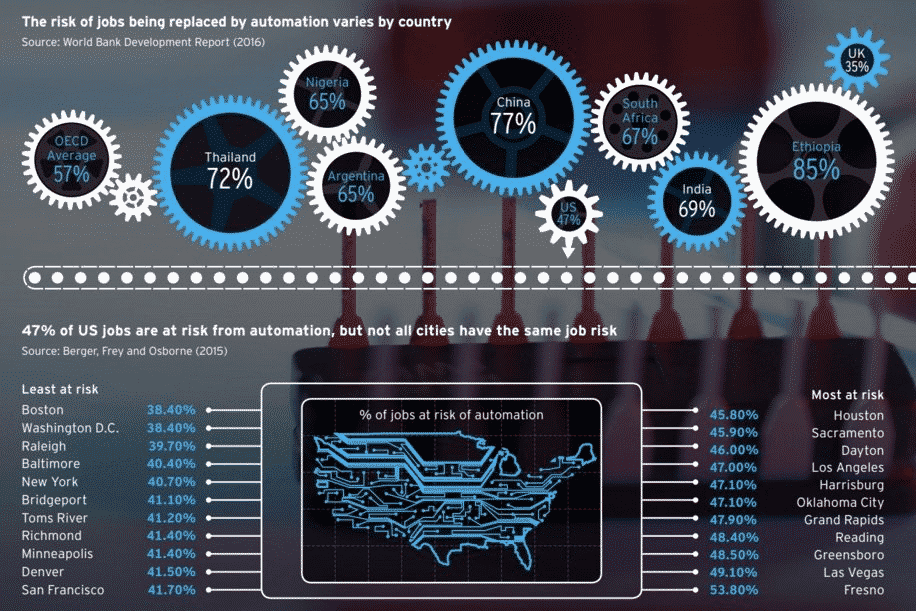
The effect will ripple out, as there are jobs that rely on other jobs (such as repair stations for large trucks) that will be devastated. Families and cities will experience crippling ripples from increased job automation.
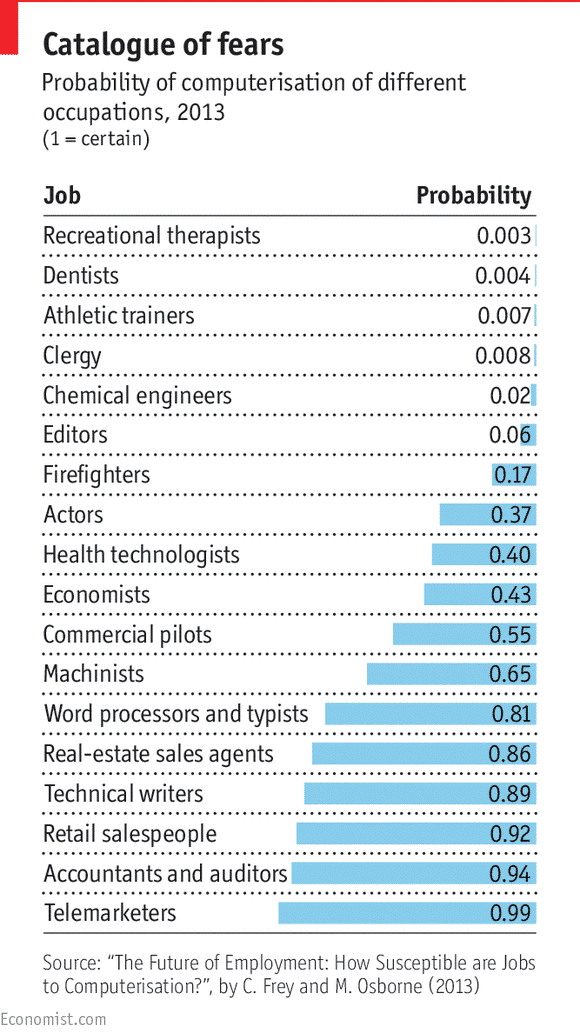
Some job types will be hit much harder, must faster, than others with automation/AI.
With some still in power making handsome paychecks, who will care? Who will look out for this newly unemployed chunk of society?
That answer remains unseen.
These concerns are valid.
On a macro scale, we may watch the development of gross inequality in the coming years and decades.
National welfare budgets would become unsustainable. Jobs that have not yet been displaced would become more valuable, more desirable, and therefore pay higher wages—furthering the inequality and wage gap.
This would introduce a degree of class inequality that hasn’t been seen since the feudal ages of the bourgeoisie and the proletariat. The monarchs and the surfs.
It’s no secret that we as nations move slowly to address rapid change. Laws from the 1800’s and 1900’s are still being used to handle court cases about the internet. Legislation and corrective action have a far longer time-to-market than the speed at which automation will overhaul society and work as we know it.
If this continues to be the case, the impacts could be unprecedented. The entire economic wheel would slow, or stop spinning, as machines earn the wages humans once survived on. People would be left to fend for themselves.
The increase in margins and profits would be funneled to the few remaining employees and managers who survive the revolution.
If you thought the 1% vs 99% was tough, wait until it’s the 0.1% vs the 99.9%.
Let’s return to our original dichotomy quickly. We are walking on the razor’s edge of either the greatest societal development since the organization of individuals into tribes; or the catastrophic introduction of a system that would create greater inequality than feudal societies of old.
What separates these two scenarios? What is the catalyst that turns automation into a blessing or a curse?
The answer is seemingly innocuous. Surprisingly simple. It always has been.
Money.
If we did not require money, or least were not required to earn money to justify our right to exist, the problem of mass unemployment would cease to be an issue at all.
Work and trade of goods (facilitated by currency) is necessary to an extent. Nature requires us to labor for food, pleasure, and survival. The issue comes in the prevalence or necessity of these extreme levels of labor.
If we did not need to earn money, or better yet, if our economy did not revolve around money, we would be free to pursue utopia. If you require money to survive—and more importantly, thrive—the impending automation revolution presents grave problems.
Is there a solution to this? Certainly.
There are a few options. One idea at the forefront is an easy concept: What if we gave everyone money?
Simple Solutions: The Case for a Universal Basic Income
What is universal basic income (UBI)? The premise of UBI is simple: give everyone a fixed amount of money per month, simply on the basis of being human and being a part of society.
You do not need to prove that you require the funds, that you deserve them, or that you cannot acquire them otherwise.
You receive a predetermined amount of money each month. Period.
Let’s begin by addressing some common concerns about UBI. Namely: How does this address the automation revolution and subsequent job loss? Where does the money involved in UBI come from? What does UBI accomplish?
Earlier we noted that what will make automation a blessing or curse is simple: money.
If members of a society must work to earn money to exist, automation presents a problem. However, if money earned is separated from time worked, the problem is alleviated. To be clear, automation will happen whether we like it or not. The economics are sound, and the market will react accordingly.
It should be noted again that it isn’t entirely clear that the automation revolution will lead to long-term mass unemployment, though many experts believe that outcome is likely. Others argue that in the face of automation, the economy will arbitrarily expand to create new wants and needs, new lifestyles, new jobs, and new reasons to want to work. It isn’t clear that this will happen, though, and even if it does, the transition to a much more highly automated world is likely to be rocky, and future jobs are likely to be quite precarious. Thus, UBI as a safety net and transition tool yet holds much promise.
If you were granted a basic monthly income that would give you a reasonable standard of living, such as food, clothing, shelter, and savings, you would then have a choice of whether you want to work or not.
We don’t need to eradicate income inequality if some people want to continue to work and earn funds on top of their basic income. That’s great! More power to ya.
The point is removing the necessity of work from society.
If only a few workers remain employed, and society continues to press on, where do these funds come from? Easy: from the subsequent increase in productivity and efficiency granted by the very machines automating the revolution.
If companies can move from employing someone for $60,000/year to employing a machine that can operate for pennies of electricity each year and do the work of 5 employees, the cost savings are immense. In almost every single industry, salaries for human labor are the single greatest expense.
Automation can pay for itself. If we let it.
There are other ways the funds could be achieved. The use of machines to replace workers could incur a corporate tax. The taxes could be redistributed to the collective.
Another very easy answer is that we could—as a global society—stop funding war. War commands such an absurdly large budget that most of us cannot fathom the amount of money that goes into war. War is a good business. If this were reduced, not even canceled entirely, it could easily pay for UBI year after year.
Many countries and groups are advocating in favor of UBI. Trials have begun. In fact, the largest democratic nation in the world has begun a UBI trial. India, if successful, could pave the way for the introduction and implementation of UBI systems globally.
An interesting sidenote is that UBI could be distributed via cryptocurrency, while regular work salaries would continue to be distributed through fiat currency. The separation would allow basic income to be handled via blockchain and “discretionary” income to be earned in cash.
Now, UBI is not without its fair share of critics, but it is a better solution than the probable alternative of admitting defeat to the machines and plunging into mass unemployment. Regardless of whether the most dystopian predictions prove accurate, the automation revolution will surely cause massive disruption in the world of work, and it seems prudent to implement precautionary measures to help us move smoothly through the transition. UBI systems could be implemented rapidly if this was our focus. The quality of life for the collective would increase.
If UBI is implemented as the solution to automated job loss, humans will be free to pursue their dreams and the collective enrichment of our species. We can focus on rapid innovation of technology, medicine, culture, and exploring the earth and solar system. All of this, accomplished without the fear of starving, homelessness, or great inequality.
UBI offers a viable and systematic solution for a problem that is barreling toward us, whether or not we take action against it.
The Resiliency of Humanity
The impact of the automation revolution is still unclear. Whether it will push us toward a brilliant, beautiful future, or usher in a new dark age, where inequality is the plague that infects nations, remains to be seen.
As it is unclear, there is no need to concede to fear, to worry incessantly about the reorganization of jobs and social structures that our machine friends will bring about.
Humanity is among the most resilient species on the planet.
As recently as the early 1900’s, over 90% of the population was employed as a farmer. As technology and processes improved, we worried about the same issue of unemployment. The Luddites famously sought to halt the Industrial Revolution as a result of the very same concerns we are now facing.
Now, in modern society, only 9% of the population works as farmers, and we still have general employment for everyone.
The same concerns arose again in the 1930’s when the means of production became drastically better and workers could now do more with less. However, we pulled through this, maintaining employment and a high standard of living for everyone. In fact, most people would argue that the Industrial Revolution was incredibly beneficial to society, and was a pivotal moment in the development of modern society.
All technological revolutions have ushered in new waves of jobs, new types of work, new possibilities around which we build our societies.
The automation revolution, like any other major change, should not be something to fear so long as we are willing to adapt to the changes it will bring.
This leads us towards utopia. We may be on the verge of the dissolution of monetary societies, the alleviation of much human suffering.
We as a species will be able to chase our dreams, unencumbered by the trivial labor of everyday busywork. We can become better than we ever imagined.
Let us welcome the robot working class with open arms, and let us all become kings.
—
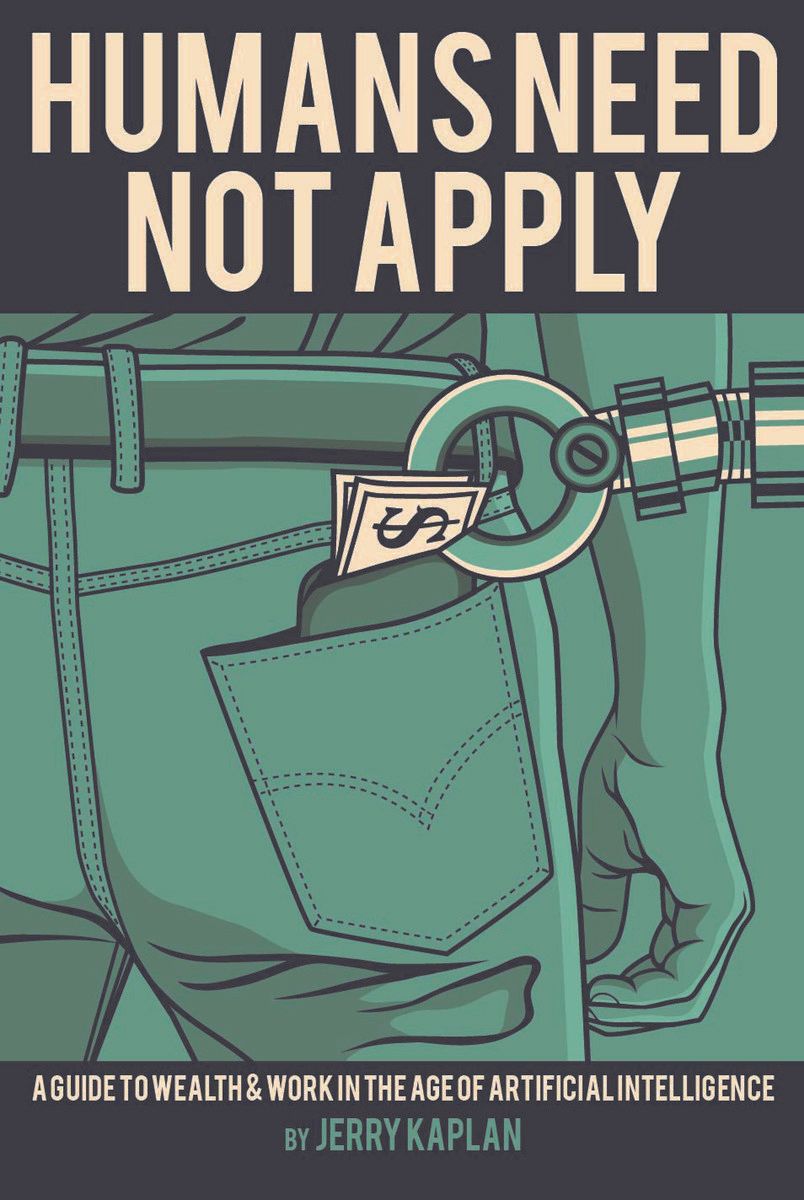
Humans Need Not Apply by Jerry Kaplan
Automation and artificial intelligence will radically change our socio-economic landscape, far faster than we anticipate. This analysis from a Silicon Valley insider takes us through the ramifications of these developments and dives deeper into the compelling possibilities automation presents and what the future of work will look like. Humans Need Not Apply is an eye-opening experience, recommended for anyone with an inkling in technology or robotics.

Eric Brown
I'm a creator, artist, writer, and experience designer. I help people become themselves.

